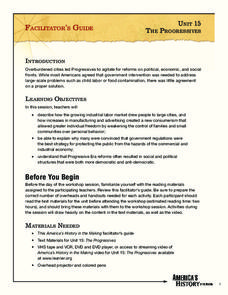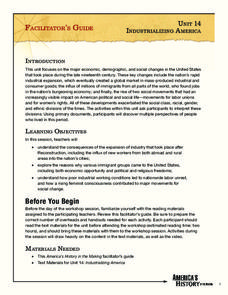Bill of Rights Institute
Freedom for All?
What did abolitionists have in common with those working for women's rights? How has the Native American struggle for voting rights differed from the struggles of other groups? Class members examine the 15th, 19th, 23rd, 24th, and 26th...
Facing History and Ourselves
The Audacity of a Vote: Susan B. Anthony’s Arrest
Susan B. Anthony's speech "Is It a Crime for Women to Vote?" takes center stage in a lesson that asks class members to consider how they might respond to what they consider an unjust law. Groups work through the speech paragraph by...
Annenberg Foundation
Egalitarian America
What does a true American represent? Scholars investigate the equal rights era of the 1960s and 1970s in the 20th installment of a 22-part series on American history. Using photographic, magazine, written, and video evidence, groups...
Stanford University
Lesson Plan: The Children's Crusade and the Role of Youth in the African American Freedom Struggle
Young people played significant roles in the Civil Rights movement. Class members examine the contributions of Barbara Johns, Claudette Colvin, Mary Louise Smith, and the children of Birmingham,...
Annenberg Foundation
The Progressives
The Progressive Era brought about a word that often leads to turmoil—change! Learners research the late 1800s in American history to uncover societal issues gripping the nation back in the day. The 15th lesson of a 22-part series...
Smithsonian Institution
Eastern Indian Wars
Many know that Native Americans were forced off their lands and moved west, but how did these people react? The Red Sticks faction of the Creek nation opted to defend themselves and their lands in a series of wars called the Eastern...
Curated OER
Chapter 28: Red Flags and Velvet Revolutions: The End of the Cold War, 1960-1990
Set your historians up for testing success using this interactive flashcard tool. It is one of many learning strategies offered in this thorough online resource. Although designed for use with a text, the site is valuable independently....
Learning to Give
Heroes with Heart
This resource provides a lesson that will have learners explain how women and minority figures worked for the common good of their community.
Annenberg Foundation
Industrializing America
Imagine an eight year old spindle boy working barefoot in a factory in the late 1800s. Scholars research the industrial period in American history in the 14th lesson of a 22-part series that explores the country's background. Groups...
Curated OER
The Settlement of the Chesapeake
Focusing on the Virginia and Maryland settlements in the 1600's, this presentation is a complete and thorough resource during a unit on Colonial America. It includes pictures, maps, and interesting discussion points for you to address...
Curated OER
Latino Contributions To American Culture
Students create their own working definition of what it means to be an American. They examine the achievements of Latinos and discuss how the contribution of these Americans have enriched and helped shape American culture.
Curated OER
Globalization's Effects on Indonesian Women
Twelfth graders investiage the status of women in contemporary Indonesian society and the business strategies of companies located there. They create a Web page that explains the effects of globalization on Indonesian women and shows...
Curated OER
Depicting Motherhood in Family Stories
Young scholars examine the roles of mothers and grandmothers by looking at black-and-white photographs of one American family and comparing that family's multi-generational story with their own. In this mothers and grandmothers lesson...
Curated OER
Women's History
High schoolers explore achievements of women in America, choose contemporary American woman to research online, and write paper on how that particular woman affected American life.
Library of Virginia
Antebellum Freedom
From indentured servitude to involuntary race-based servitude, slavery has taken many forms in American history. Class members examine three manumission petitions that reveal how the rights of African Americans and African American...
National Woman's History Museum
The National Woman’s Party
Two parties led the women's suffrage movement. The National American Woman Suffrage Association (NAWSA) was a moderate organization while the National Women's Party (NWP) was more militant. Young historians investigate why members of the...
Center for History Education
The Non-Importation Movement
Boycott for free trade! An eye-opening lesson explores the non-importation movement created by American colonists in response to the Stamp and Sugar Acts. Scholars specifically look at the impact the boycott had on colonial women who had...
Curated OER
Antebellum Revivalism and Reform
A gold mine for American history teachers, this presentation cascades through the middle of the 19th century with the central themes of moral and social reform. Between the blossoming Mormon church, the tightening of the Temperance...
Learning for Justice
Mary McLeod Bethune
Young historians conduct a close reading of the text of an interview with Mary McLeod Bethune, the daughter of former slaves who taught herself to read, grew up to establish schools for other Black women, and went on to become an advisor...
DocsTeach
Analyzing a Photograph of Clara Barton
Just who was Clara Barton? Using an archive photo from the National Archives, class members consider the legacy of the founder of the American Red Cross. The activity includes the photograph, along with prompts to help young scholars...
Center for History Education
Methods of Reform: The Lowell Mill Girls
Although the girls and women who worked in the Lowell Mills are not often seen this way, they are the forbearers of the American labor movement. Pupils examine primary sources, including testimony about life at Lowell and labor laws, as...
Annenberg Foundation
A Nation Divided
Can a presidential election cause a civil war? Learners research the events surrounding the presidential election of 1860 in a lesson that explores America's history. Using maps, videos, and primary sources, they uncover, brainstorm, and...
US House of Representatives
Objects in Time
Artifacts can be used to study people and events of the past. That's the takeaway from the fifth lesson plan in a unit study of African Americans who served in Congress. Groups select an artifact associated with a Black Congress Member...
Curated OER
Exploring the Sky: Reading Maria's Comet
Discover the science behind astronomy. After reading the book Maria's Comet, which is about a young woman who breaks new ground by becoming a female astronomer, young learners practice reading comprehension with worksheet questions about...

























